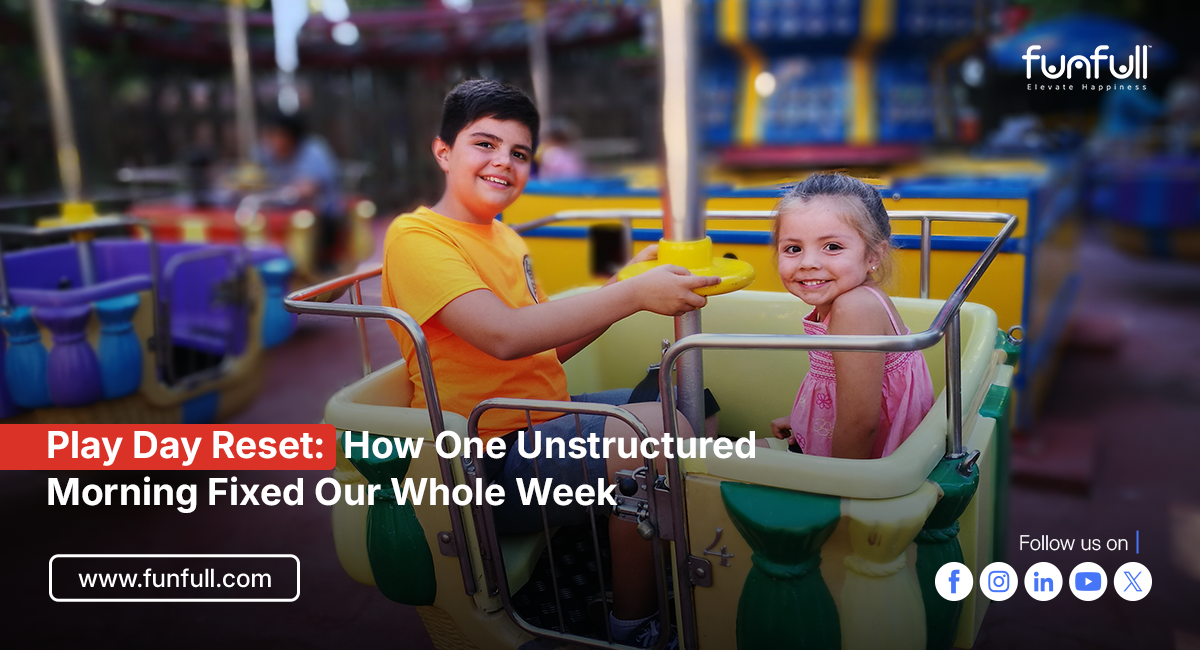Play Day Reset: How One Unstructured Morning Fixed Our Whole Week

When Routine Isn’t the Problem — It’s the Build-Up Behind It
Parents often build solid routines to stabilize their home — structured mornings, activity lists, transition plans, even weekend outings scheduled for “balance.” But what’s easy to miss is how much emotional pressure that structure carries.
Over time, even well-planned schedules can quietly weigh down a child’s nervous system. It’s not about how organized you are — it’s about how little room there is to release what’s been carried all week.
That’s when everything feels off:
Moods clash, siblings argue over nothing, and basic instructions become battles. The structure is still there, but its energy is rigid, resistant, and stretched.
The solution, surprisingly, isn’t more routine — it’s removing it for a while. And that’s where the power of an unstructured family play day comes in. Not a vacation. Not a reward. Just a reset.
A single morning of unscripted, child-led play — with no schedule, transitions, or adult-guided agenda — can quietly clear the emotional residue that builds up behind even the most peaceful homes.
And if you’re searching for activities for kids near you that don’t require structure or outcome? You may not need to leave the house. Sometimes, the reset happens right in your living room.
What an Unstructured Morning Actually Does to a Child’s System
Children carry more than we realize. Even in happy environments, they hold in emotions they couldn’t name during the school day, they hold back tears from the playground, and they suppress frustrations from too many “no’s” or not enough downtime.
And most of the week, they don’t have room to release any of it.
An unstructured morning gives them that space, without requiring them to explain themselves.
Here’s what happens in real-time when a child gets a few uninterrupted hours of full-autonomy play:
- They initiate instead of waiting to be told what to do
- They build, destroy, and rebuild — processing control and repair
- They shift from loud chaos to quiet focus, on their own
- They invite caregivers into their world only when they feel safe doing so
- They release energy, emotion, and tension without adult interference
No schedule allows for that kind of full nervous system reset like unstructured play does.
And for kids who don’t naturally talk about their feelings? This kind of morning is often the most healing thing they’ll get all week. It’s not unproductive — it’s therapeutic.
This is why some of the best fun things to do on the weekend are actually the least structured. It’s not about entertainment — it’s about emotional space.
How to Create a Real Reset (Without Leaving the House)
This doesn’t require a Pinterest-worthy setup or expensive activity list. In fact, the less prepped, the better. The key is to create time without direction, not just space without walls.
Here’s how to build an effective unstructured morning:
1. Protect the time window.
Pick 2–3 hours on a weekend morning. Don’t mix in errands, lessons, or chores. Hold the time like it matters — because it does.
2. Don’t suggest activities.
Don’t ask “Want to draw?” or “Should we build something?” Let the initiation come from them. Offer access, not ideas.
3. Remove timers, transitions, and tasks.
If they want to build blocks for 2 hours, let them. Let that happen if they switch between 7 things in 30 minutes. Flow, not structure, is the goal.
4. Stay nearby — but don’t lead.
You can drink your coffee on the floor, fold laundry in the same room, and be physically and emotionally available, but not in charge.
This can still be unstructured for families who want to leave the house. A slow visit to a park, indoor gym, or low-key family fun center, with zero time constraints or planned outcomes, can extend the same energy.
Let your child lead. Let the space hold them. Let the experience evolve without steering it.
These types of outings also fall under the best low-pressure family attractions near you — places that don’t rush the experience, just hold it.

Why This One Morning Improves the Entire Week
Parents often expect results from consistent discipline or structured bonding, but rarely from stillness and freedom. And yet, what happens after an unstructured morning speaks louder than any consequence or reward chart.
Here’s what tends to shift for the days that follow:
- Kids become more flexible. After having a pocket of full control, they’re less reactive to guidance the rest of the week
- Siblings fight less. Shared play without adult management allows natural cooperation to unfold and builds emotional intelligence in real time
- Behavior becomes less “clingy.” When kids feel seen and trusted without constant correction, they seek attention less through misbehavior
- Transitions become smoother. Their systems are regulated. That makes saying “let’s go” or “time to stop” less of a shock
- You get fewer emotional outbursts. Because you made room for emotions to move
Think of it as draining pressure from a pipe before it bursts. The calm you create in those hours quietly supports the entire emotional infrastructure of your week.
Final Thought: Real Play Isn’t a Distraction — It’s a Release
We often talk about play like it’s the reward after hard work. But for children, play is the work. It’s how they think, cope, imagine, and rebuild — especially the kind of play they control, especially when there are no expectations attached to it.
One unstructured morning won’t solve everything. But it will give your child what few systems allow: the chance to exist without performance. To lead instead of follow. To move instead of manage. To express instead of explain.
And in that space, something powerful resets.
The mood shifts. The body calms.
The tension drops. The connection reappears.
And the home softens.
So when things feel off, don’t tighten the structure.
Loosen it. Step back.
And let one quiet morning repair what pressure tried to erode.
Visit more: Best Family Fun places for kids near you

Comments
Post a Comment